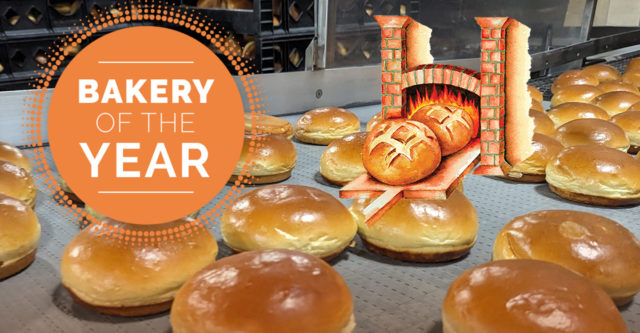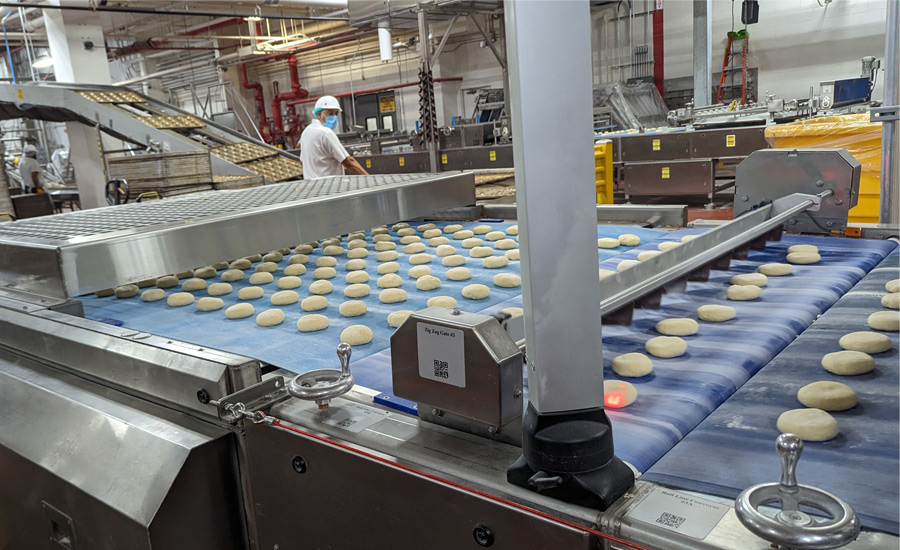Bakery of the Year: Highland Baking
October 30, 2023
Bakery of the Year: Highland Baking
October 30, 2023The Bottom Line:
- Its two facilities total 570,000 square feet in production space
- Focusing on frozen finished products facilitated future growth
- The company offers a robust diversity, equity, and inclusion program
If you’ve never visited a large-scale bakery facility, stepping onto the production floor of Highland Baking’s flagship location in Northbrook, IL is likely to overwhelm. Between the mammoth ovens baking batches of breads, to the skyscraper-like cooling towers moving thousands of artfully crafted brioche rolls toward their next destination, to the state-of-the-art automated packaging robots handling the cartons of finished product, it’s hard not to be impressed—even awed—by the scope of the operation.
However, there’s much more to Highland Baking than sheer size and approximately $225 million in annual revenue. In addition to producing a massive number of finished bread products that ship frozen to scores of customers all across the country, the company boasts a rich history, notable growth, attention to quality, and commitment to the development of its workforce. It is these qualities that add up to Highland Bakery being chosen as Snack Food & Wholesale Bakery’s Bakery of the Year honoree for 2023.


Courtesy of Jenni Spinner
Highland Baking: Key Personnel
Stuart Rosen, CEO
Michael Galenson, president
Frank Nevarez, director of operations
Herman Brons, CFO
Andy Gorey, director of supply chain and external operations
Jason Holt, director of engineering
Robin Slivovsky, director of national sales
History
According to Highland Bakery CEO Stu Rosen, the now-massive operation’s beginnings were humble. Rosen’s father first opened for business in 1984, starting with five employees (including Dad) staffing a 1,500-square-foot facility in Highland Park, IL. However, the family’s passion and commitment to baking goes back a lot further than that.
“My great-grandfather founded a bakery company in Chicago in 1909, which became quite successful,” he relates. “My grandfather, and then my father and his brothers, went to work for that company.”

Courtesy of Jenni Spinner
Looking for a reprint of this article?
From high-res PDFs to custom plaques, order your copy today!
Success was not instantaneous, Rosen says. The original family affair fell on hard times, and they took their skills to work for another, larger baking company. Rosen’s father (the oldest of the brothers) set out on his own and bought a bakery in Florida—unfortunately, that also failed to pan out.
Determined to succeed, and with encouragement from the rest of the family, Rosen moved back to the Chicago area and eventually opened the Highland Park shop--over the course of the next four decades, the modest shop gradually grew to become the large-scale, nationally known Highland Baking of today.
Products and innovation
In the early days, the team distinguished itself by offering a range of items that the other larger bakeries in the area weren’t offering, Rosen says.
“Bagels, hand-knotted rolls, and pizza bialys were some of the early unique favorites,” he shares.




Courtesy of Jenni Spinner
Over time, the bakery expanded its offerings, added products, and grew its customer base. Rosen says the success of the company and its initial takeoff can be credited to hard work, luck, and excellent people (employees, customers, and suppliers supporting the mission, as well as “the incredible vision of my father to always be looking five steps ahead, being willing to take large yet prudent risks, and a relentless desire to continue to improve the bakery whether we were doing horribly, great or anywhere in between.”
Today, the company offers its customers a wide array of baked-fresh, shipped-frozen products. The lines, each available with variations, include:
- Burger and hot dog buns
- Pretzel rolls
- Ciabatta
- Sub rolls
- Pan breads
- Specialty sandwich rolls
- Dinner rolls
- Slider buns




Courtesy of Jenni Spinner
“I am proud of how consistently we deliver from the sample process to commercialization, and then month in and month out, year in and year out,” Rosen relates. “I also believe we have been innovative in finding ways to commercialize more specialty products to bring them to a more mass audience in volume and at a price point that worked for our customers. We also are very consistent and committed to the ingredient sources we use to maintain that consistency and quality and believe in prioritizing quality, consistency, and the satisfaction of our customers over short-term profitability concerns.
The company also is keenly interested in product innovation, but that conversation, Rosen says, starts with its clients.
“A good portion of our business is proprietary, customized offerings, so we always start by listening to the customer to what they are looking for and what their goals are,” he says. “Sometimes it’s culinary driven, sometimes it’s cost, sometimes shelf life or other concerns.”
Once the innovation conversation begins, Rosen says, the team brings in Highland Baking staff from across the workforce. On a regular basis, staff coming from various departments—management, R&D, QA, operations, culinary, engineering, sales, purchasing—gather to discuss projects and suggest possible paths forward. These teams also review samples together weekly, or more often if needed, prior to them being shared with the customer.
Growth and expansion
Along the way, the Highland Baking team is prepared to make tough decisions, including the move to cease its fresh bread offerings and focus on its frozen offerings.
“The fresh bread business is where we started; many of us learned the business from that side including myself and I have tremendous respect for those bakeries still doing it,” Rosen relates.
The company’s decision to focus on frozen, he says, came down to two factors.
“We did not have enough labor to support both businesses—while fresh was about 17% of our sales at the end, it absorbed closer to 30% of our labor, Rosen says.
Secondly, fresh bread is hard work, with bakers being called to work on holidays, weekends, and in tough conditions to get the job done and meet customer demands.
“We saw a shift in labor dynamics where people were less tolerant of this, especially if other jobs existed that didn’t have these issues, so in essence we were scheduling the whole company to the worst of the schedule to keep the fresh side as happy as possible.”




Courtesy of Jenni Spinner
Additionally, phasing out fresh bread products enabled Highland Baking to focus on growth, fill vital job openings, and effect other improvements.
“Our sales are up approximately 50% since our exit from fresh and there is no way we could have accomplished this while still being in fresh,” Rosen says. “More importantly, our employees are more satisfied as are the customers we continue to serve.”
The company has two facilities--the Northbrook location, which stretches over approximately 300,000 square feet, runs six production lines (including the artisan product line just starting installation). It also has a second facility in Spartanburg, SC, which is 270,000 square feet and runs three lines, including the recently added soft-bun line.
Highland Baking has several expansion initiatives in the works at both facilities. In May, the company announced it landed a total of $32.5 million in New Markets Tax Credit allocations—a program designed to incentivize development and growth in distressed areas) to expand in Spartanburg—to help build an additional production line. Rosen says that in addition to increasing capacity and diversifying capabilities, the expansion will attract new jobs, elevate the environment for employees, and uplift the area.


Courtesy of Jenni Spinner
“The expansion in SC we believe will ultimately bring close to 100 new jobs, allow us to improve conditions in the bakery for all employees—existing and new—and keep the bakery economically competitive well into the future, supporting continued increases in wage rates and benefits.”
The first round of production just kicked off in mid-September, Rosen says, and the company expects to have product tested, approved, and rolled out by early November.
Development and diversity
Like many manufacturing facilities, Highland Baking is staffed by a workforce comprising people from different cultures, communities, and economic backgrounds. The company places a priority on diversity, equity, and inclusion (DE&I) efforts—headed by DE&I Director Nathan Norris)—to ensure it continues to provide a welcoming work environment.
“DE&I has always been part of our culture even before there was DE&I,” Rosen states. “My father was known for saying “It doesn’t matter what your name is, what you look like, the color of your skin, man or woman, big or small, or what piece of paper you can hang on your wall. What matters is what you do and how you treat those around you.”
While Rosen admits the company did not always hit the mark relating to recruiting from a diverse base, or making sure all felt respected and included, they have improved and always strive to do better.
“We know we aren’t as good as we should be and we need to hold ourselves accountable,” he says. “The world has changed and the old ways of doing things aren’t gonna cut it. There just aren’t enough workers to go around, so you better recruit from every single group you can and make sure you hold onto to everyone through respect and inclusion.”
The company also provides robust training and career development programs for employees, enabling them to develop skills that will be useful now and years down the road. This enables the company to support employees from underrepresented groups and underprivileged backgrounds to move up the ranks and enrich their careers, he says.
“We believe it’s a risk worth taking to become an employer of choice within our industry,” Rosen states.
Looking ahead
Highland Baking has come a long way since its first 1,500-square-foot facility got its start nearly 40 years ago. The company continues to grow and seek out ways to improve—between the new production lines at both facilities, addition of freezer storage capacity, new automated packaging technology, and other enhancements, Highland Baking also is lengthening its list of product offerings. Rosen credits the company’s continued growth and success to the employees, working hard at every level to ensure customer satisfaction.
“Starting with my father who was truly a unique and visionary individual, and then in so many of the leaders we have today—they have such diverse, eclectic, and often challenging background,” he says. “They bring this to the table in a way that not only creates compassion and understanding, but also a tremendous dedication and will to be the best. I am so fortunate to go to work for them every day. The people will always be the story.”








